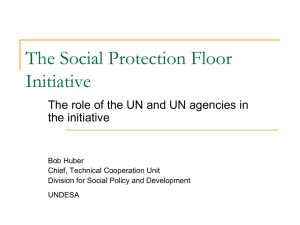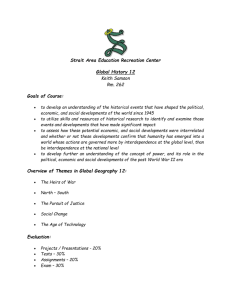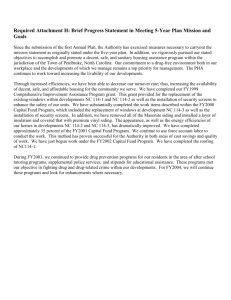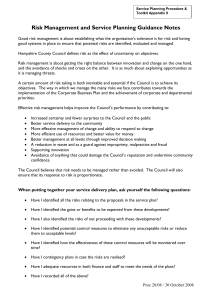Commemoration of the 60 anniversary of the UN Statistical Commission Ivan P. Fellegi
advertisement
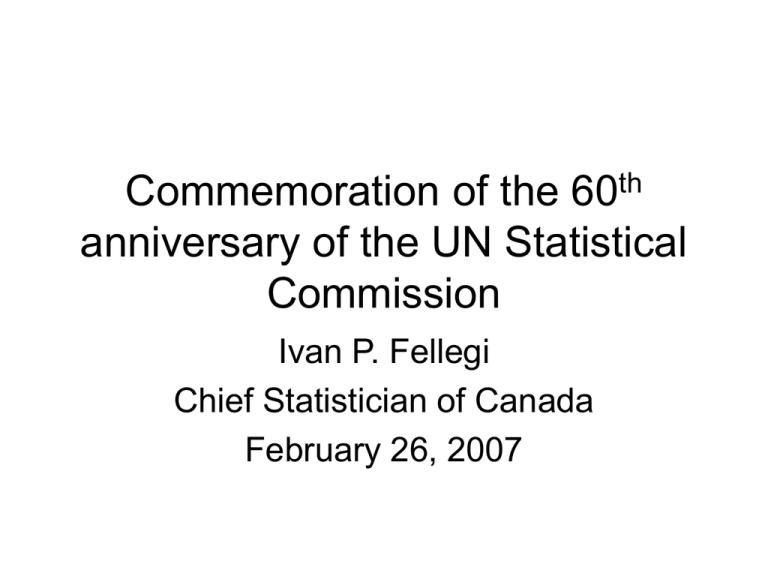
Commemoration of the 60th anniversary of the UN Statistical Commission Ivan P. Fellegi Chief Statistician of Canada February 26, 2007 Introduction • Why have been asked to talk? • What have I learned from many years of attending? • I will give a very subjective view of what I regard as: – positive developments – negative developments (or at least lack of progress) – the way forward Positive developments (1) I am talking about the UNSC, not the world statistical system! • Adaptation to the relative loss of conceptual leadership capacity of UNSD – city groups – Inter-agency secretariats with IMF, OECD , Eurostat, etc. • Increased overall attendance – indicating greater prestige(?); but risk to meaningful indepth interactions Positive developments (2) • Much greater attendance of heads of developing country statistical offices • Approval of important standards (but mostly in the area of economic statistics and even there relatively few) • Annual, as opposed to biennial meetings – indicating seriousness of purpose • Improved organisation: agenda, papers, timetable, etc. Positive developments (3) • Inter-secretariat working groups a very mixed bag: – Most instances of inter-agency cooperation are essential – Inter-agency cooperation in national accounts outstanding. Also best example of adaptation – But, while some would earn an “excellent” mark, the majority would not get more than a “passing” grade Positive developments (4) • An instance of successful assertion of professional authority – We successfully challenged the methodology used in compiling one of the high visibility reports issued by the UN system; – We were successful in getting it changed in the face of strong initial opposition; – But there are too few instances. Some negatives (1) • Too little involvement in the development of social statistics • No equivalent of inter-agency work on national accounts – while many city groups do excellent work, the driving force is often missing • No inter-agency capacity to coordinate international household survey initiatives in spite of joint interest in measuring living conditions in developing countries Some negatives (2) • Death of NHSCP – a very negative development • Insufficient attention to capacity building, particularly in household surveys (the new International Household Survey Network but a pale shadow of NHSCP) • Creeping politicization: – even among NSO heads; and – far too many instances of permanent missions (non-statisticians) addressing UNSC – which was, is and should be a purely professional body What is unchanged • With rare exceptions, we don’t set crisp and realistic goals • Partly as a consequence, our discussions and documents are too bland • When we do set goals, they tend to be far too sweeping, hence not realistic; • Partly as result, we have no consistent follow-up practices The balance? • The overall mandate of the UNSC is to coordinate the world statistical system • But: – Is there a world statistical system? – Can it be effectively coordinated? – Not on current evidence • Coordination would not earn more than barely passing mark – in spite of great dedication and excellent work of the participating national and international organisations • The same about national capacity building The way forward (1) • we have very little formal authority, but a great deal of professional authority – we need to use it more – Who can put up a credible professional argument in the face of the considered opinion of the combined heads of the world’s national statistical offices? • However, authority erodes if it is not used! The way forward (2) • Professional authority gets irremediably diluted if seen to be wielded for political reasons. • Whereas we have no political influence, authority or standing, • our opinions have an unchallengeable professional authority! The way forward (3) • So we need to be more ready than in the past to assert our professional authority; • In doing so we should be both fearless and thorough – when it concerns the quality of international statistical work (e.g. the quality of the MDG indicators) – in the coordination of international statistical survey work – in the development and propagation of best professional practices The way forward (4) • While standards might be too ambitious (and perhaps unnecessary) in many areas of social statistics, we should be aggressive in developing conceptual frameworks • We definitely need to be more evidence based in the area of national capacity building: currently we regularly fail to meet the unrealistic goals we set for ourselves The way forward (5) • First and foremost: At all costs avoid politicisation • It seriously detracts from our professional standing – the only one we have.
